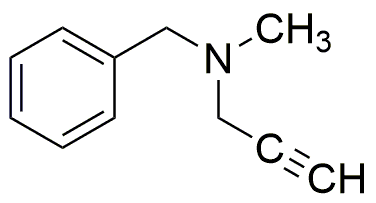Pargyline is widely utilized in research focused on:
- Neuroprotection: Pargyline is used in studies investigating its potential to protect neurons from damage, particularly in neurodegenerative diseases like Parkinson's. Its ability to inhibit monoamine oxidase (MAO) can help increase levels of neurotransmitters, which is beneficial in maintaining cognitive function.
- Antidepressant Research: Researchers explore its role as an antidepressant due to its MAO-inhibiting properties. This can lead to enhanced mood and emotional well-being, making it a subject of interest in the development of new antidepressant therapies.
- Cardiovascular Studies: Pargyline has applications in cardiovascular research, where it is examined for its effects on blood pressure regulation and vascular health, potentially offering benefits in managing hypertension.
- Pharmaceutical Development: The compound serves as a valuable reference in the synthesis of other pharmaceuticals, particularly those targeting neurological conditions, due to its unique chemical structure and properties.
- Research on Aging: Pargyline is investigated for its potential effects on aging processes, particularly in extending lifespan in model organisms, which could have implications for age-related health issues.
Información general
Propiedades
Seguridad y normativas
Aplicaciones
Pargyline is widely utilized in research focused on:
- Neuroprotection: Pargyline is used in studies investigating its potential to protect neurons from damage, particularly in neurodegenerative diseases like Parkinson's. Its ability to inhibit monoamine oxidase (MAO) can help increase levels of neurotransmitters, which is beneficial in maintaining cognitive function.
- Antidepressant Research: Researchers explore its role as an antidepressant due to its MAO-inhibiting properties. This can lead to enhanced mood and emotional well-being, making it a subject of interest in the development of new antidepressant therapies.
- Cardiovascular Studies: Pargyline has applications in cardiovascular research, where it is examined for its effects on blood pressure regulation and vascular health, potentially offering benefits in managing hypertension.
- Pharmaceutical Development: The compound serves as a valuable reference in the synthesis of other pharmaceuticals, particularly those targeting neurological conditions, due to its unique chemical structure and properties.
- Research on Aging: Pargyline is investigated for its potential effects on aging processes, particularly in extending lifespan in model organisms, which could have implications for age-related health issues.
Documentos
Hojas de datos de seguridad (HDS)
La SDS proporciona información de seguridad completa sobre la manipulación, el almacenamiento y la eliminación del producto.
Especificación del producto (PS)
La PS proporciona un desglose completo de las propiedades del producto, incluida la composición química, el estado físico, la pureza y los requisitos de almacenamiento. También detalla los rangos de calidad aceptables y las aplicaciones previstas del producto.
Certificados de análisis (COA)
Busque certificados de análisis (COA) ingresando el número de lote del producto. Los números de lote y de partida se pueden encontrar en la etiqueta de un producto después de las palabras "Lote" o "Lote".
Número de catálogo
Número de lote/lote
Certificados de origen (COO)
Este certificado de origen confirma el país en el que se fabricó el producto y también detalla los materiales y componentes utilizados en él y si se deriva de fuentes naturales, sintéticas u otras fuentes específicas. Este certificado puede ser necesario para cumplir con las normativas aduaneras, comerciales y regulatorias.
Número de catálogo
Número de lote/lote
Hojas de datos de seguridad (HDS)
La SDS proporciona información de seguridad completa sobre la manipulación, el almacenamiento y la eliminación del producto.
DownloadEspecificación del producto (PS)
La PS proporciona un desglose completo de las propiedades del producto, incluida la composición química, el estado físico, la pureza y los requisitos de almacenamiento. También detalla los rangos de calidad aceptables y las aplicaciones previstas del producto.
DownloadCertificados de análisis (COA)
Busque certificados de análisis (COA) ingresando el número de lote del producto. Los números de lote y de partida se pueden encontrar en la etiqueta de un producto después de las palabras "Lote" o "Lote".
Número de catálogo
Número de lote/lote
Certificados de origen (COO)
Este certificado de origen confirma el país en el que se fabricó el producto y también detalla los materiales y componentes utilizados en él y si se deriva de fuentes naturales, sintéticas u otras fuentes específicas. Este certificado puede ser necesario para cumplir con las normativas aduaneras, comerciales y regulatorias.


